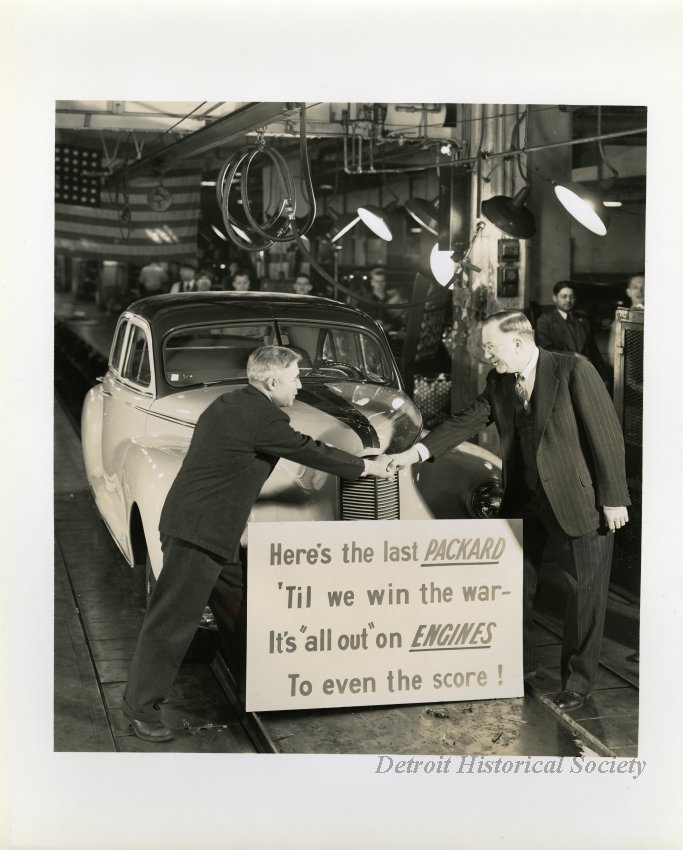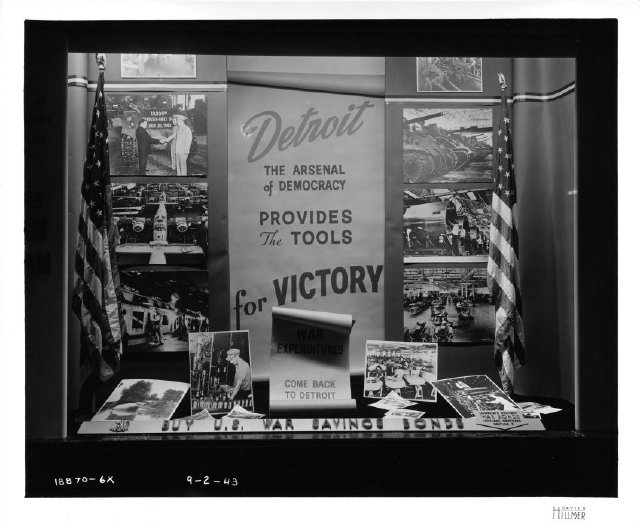Encyclopedia Of Detroit
Arsenal of Democracy
It is generally agreed that no American city contributed more to the Allied powers during World War II than Detroit. Appropriately, Detroit grew to be known as "The Arsenal of Democracy," a term coined by President Franklin D. Roosevelt during one of his Fireside Chat radio broadcasts.
In the speech, delivered on December 29, 1940, Roosevelt made a “call to arm and support” the Allied powers, including Britain. The Allies turned to the United States for assistance in the form of weapons, planes, trucks, ships and tanks. Roosevelt stated that these military devices would “enable them (the Allies) to fight for their liberty and for our security.” He reminded Americans that a German victory in Britain would greatly compromise the safety of the United States, while emphasizing that aiding Britain would save Americans from the agony and horrors of war.
In the speech, the President implored Americans to stand up as the "arsenal of democracy" as though it was their own country at war. He called on the nation to unite with swift cooperation in producing vast shipments of weaponry to aid Europe. Instilling in listeners the importance of patriotism and sacrifice, he spoke about the need for cooperation between the government and laborers. Finally, Roosevelt reminded the American people that they had both the responsibility and the means to turn the tide of the war.
Because of its strength as a manufacturing capital, Detroit was an ideal city to take on the challenge set by the President. The Detroit area’s automobile industry underwent rapid transition in order to handle the production of weapons and vehicles of war, ceasing production of vehicles for civilian use. Large auto factories, small tool and die shops, pharmaceutical manufacturers, boat builders and more began swiftly producing jeeps, M3 and M4 tanks, bombers and airplane assemblies, artillery guns, ammunition, helmets, drugs, electronics, and countless miscellaneous parts and pieces.
Ninety-one percent of all Army helmets were stamped in Detroit. Chrysler’s Detroit Arsenal Tank plant in Warren, Michigan created half the tanks made in the U.S. By the summer of 1944, Ford’s Willow Run plant completed one B-24 bomber every hour. General Motors was responsible for the greatest percentage of war materiel during the period. U.S. companies produced 2,665,196 vehicles of all types for military use by the end of the war.
If it had wheels, Detroit industrialists were in charge of manufacturing it. The Guardian Building was transformed into an annex of the Pentagon. Many corporate officers became high-ranking Army officers in order to skirt bureaucratic red tape. In all, Detroit firms, with facilities across the country, produced 25 percent of everything used by our allies.
The social landscape of the city changed greatly during the war. Within the first year and a half following the attack on Pearl Harbor, 350,000 workers from the American south and elsewhere moved to Detroit to join in the war effort. With holes in the labor force created by men entering military service, women were hired for factory labor, shifting norms and creating the folk hero “Rosie the Riveter.” African American workers, long shut out of all but the most dangerous factory jobs, were employed in much greater numbers. Retirees and workers with physical challenges were brought on board. While about 200,000 Detroiters joined the military, over 700,000 worked to produce the items necessary for Allied victory.
This influx of newcomers put a strain on Detroit’s housing. When accommodations could be found, they were often cramped, and more so for the African American population, relegated to neighborhoods with the city’s poorest housing stock due to restrictive covenants. Rationing forced the nation to make do with less, and Detroit was no different. Families could make a difference in the war effort by collecting scrap of growing their own vegetables in a “victory garden.”
In an effort to accommodate both people and war shipments, some of the city’s earliest freeways, including the Davison Freeway and the Detroit Industrial Freeway (today I-94 between Detroit and Ypsilanti), were constructed to offer quicker access between the city and factories that were increasingly being built beyond the city limits in suburban farm lands. This changing landscape was to impact the region long after the war.
The wartime conversion of Detroit and the region’s multiple industries solidified the city’s status as the “Arsenal of Democracy.” Walter Reuther of the UAW is quoted as saying, "Like England's battles were won on the playing fields of Eton, America's were won on the assembly lines of Detroit.”



